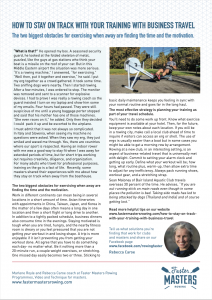“What is that?” He opened my box. A seasoned security guard, he looked at the folded skeleton of metal, puzzled, like the guys at gas stations who think your boat is a missile on the roof of your car. But in this Middle Eastern airport the situation was more serious. “It’s a rowing machine,” I answered, “for exercising.” “Well then, put it together and exercise,” he said. I put my erg together as a crowd gathered. It took some time. Two sniffing dogs were nearby. Then I started rowing. After a few minutes, I was ordered to stop. The monitor was removed and sent to a scanner for explosive devices. I had to prove I was really a rowing coach so the guard insisted I turn on my laptop and show him some of my emails. Four hours had passed. They were still suspicious of me until a young baggage porter stopped and said that his mother has one of those machines. “She even races on it,” he added. Only then they decided I could pack it up and be escorted to the airplane.
I must admit that it was not always so complicated. In Italy and Slovenia, when seeing my machine no questions were asked. When they saw my erg, they just smiled and waved me through. Yes, there are countries where our sport is respected. Having an indoor rower with me was a good way to stay fit when I was away for extended periods of time, but for short trips working out requires creativity, diligence, and organization. For many adults who travel for professional purposes, training on the go is a fact of life. Recently, some masters shared their experiences with me about how they stay on track when away from the boathouse.

rowing
Time and Motivation to Train
The two biggest obstacles for exercising when away are finding the time and the motivation. Work in different continents can mean being in several locations in a short amount of time. Asian itineraries with appointments in China, Taiwan, Japan, and Korea in the matter of a few days often means a long day in one location and then a short flight or long drive to another. In addition to a tightly packed schedule, business dinners also consume time in the evenings. Staying motivated is tough when you are tired, hungry, and the nearby fitness room is dreary or you feel pressured that you are not getting your workout in and losing shape. A trip is more enjoyable if it isn’t preventing you from getting your workout done. All agree that you have to do something each day- no matter what. Be it nothing more than a 20-minute run, a couple weight exercises, or stretching. One missed day easily becomes two or three. Sticking to basic daily maintenance keeps you feeling in sync with your normal routine and goes far in the long haul.
The most effective strategy is planning your training as part of your travel schedule.
You’ll need to do some work up front. Know what exercise equipment is available at your hotel. Then, for the future, keep your own notes about each location. If you will be in a rowing city, make call a local club ahead of time to inquire if visitors can access an erg or shell. The use of ergs is usually easier than a boat but in some cases you might be able to get a morning row by arrangement. Rowing at a new club, in an interesting setting, is an aspect of business-related travel that is universally met with delight. Commit to setting your alarm clock and getting up early. Define what your workout will be; how long, what routine plus, warm-up, then allow extra time to adjust for any inefficiency. Always pack running shoes, workout gear, and a stretching strap.
Sean Maloney of Bair Island Aquatic Club travels overseas 30 percent of the time. He advises,
“If you are out running stick on main roads even though in some places the pollution is bad. Taking side roads has led to being attacked by dogs (Thailand and India) and of course getting lost.”
Potential illness and changing time zones are major factors to contend with on foreign journeys.
Maloney says,
“Avoiding illness? No magic remedy. I get sick on trips. Economy class on planes is a big culprit. If you can go business class the air is less crowded with germs. Obviously the basic stuff- never drink tap water in Asia or emerging markets, never eat ice cream, never eat salads unless you are in a good hotel.”
Eat lightly and stay well hydrated.
Taking a multivitamin and extra vitamin C can help keep your resistance up. Carry hand sanitizers with you at all times and wash your hands frequently. On long flights, drink a lot of fluids and eat less than you would when not traveling; bring good snacks with you. Rowers can be more comfortable with upgraded seats that have more room. Otherwise, get up and stretch frequently. To avoid jet lag, try to get into the correct time zone as soon as you can. Resist sleeping a lot on long flights. It is better to get to your hotel when sleep is past due. The first day might be brutal but adjust as soon as you can. For small time changes you can ignore the differences and use the extra time to do something relaxing.
Finally, pad your weekly program with two days off so you are sure to get in all the sessions you planned. Do a harder day before you leave and allow for an easier day when you are back home to catch up on needed rest. Pay very close attention to how your body feels as this is when you may likely get sick. Sleep as much as you feel you need to get back in balance.
Resources for the business traveler include: www.concept2.com, www.rowersalmanac.com, and www.athleticmindedtraveler.com.
Masters Rowing Advocates
Would you like to publish this article in your club newsletter or website?
Join our Masters Rowing Advocates mailing list and we will send you one article a month. Sign up on our Advocacy page.
You can copy the text on this page. Or download the PDF



